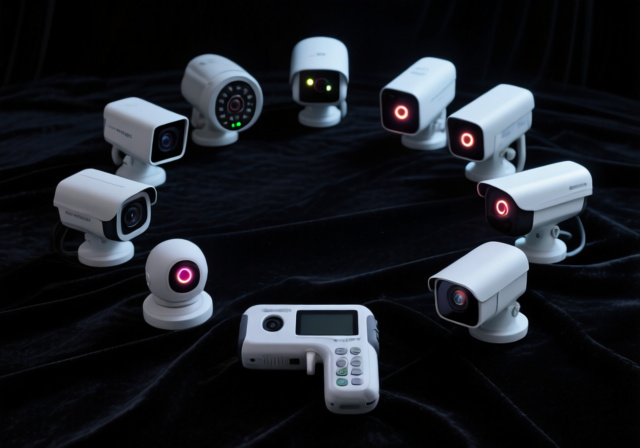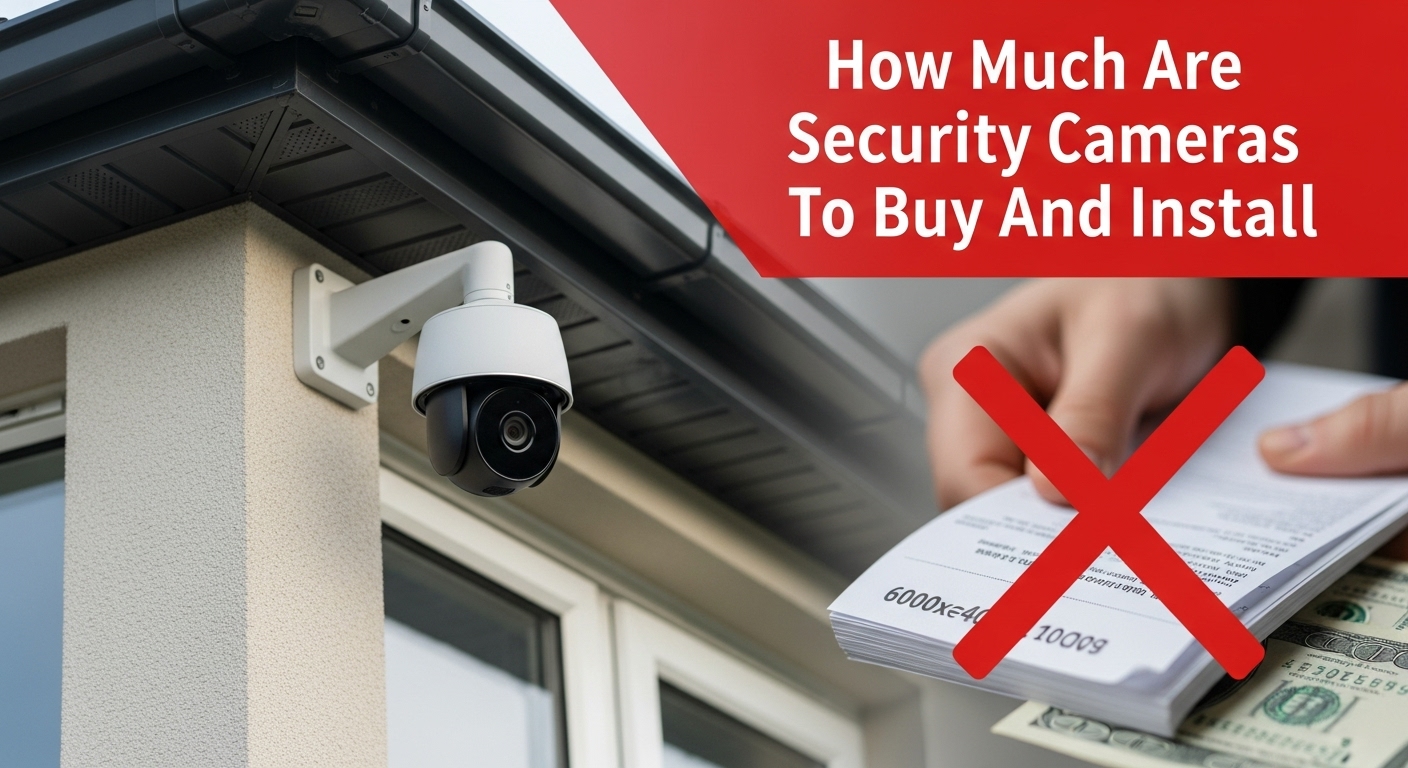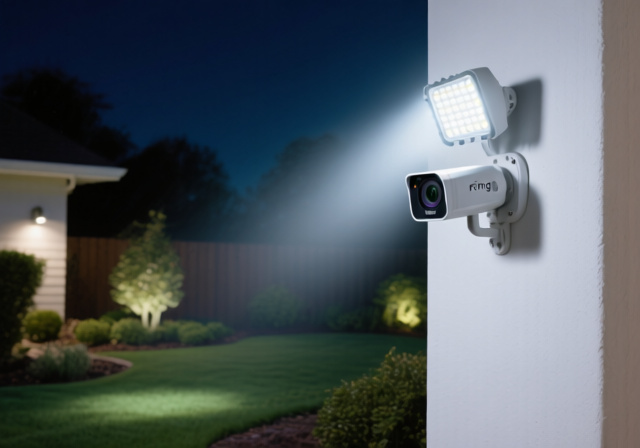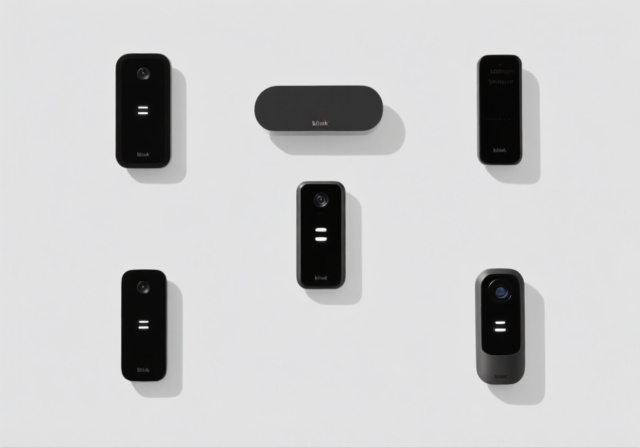



Installing a complete security camera system costs an average of $1,296 in 2025, with basic setups starting at $125 and comprehensive systems reaching $3,500 or more. The total cost depends on three main factors: equipment quality, installation type (DIY vs professional), and ongoing subscription fees. From my experience helping homeowners evaluate security options, I’ve seen prices vary dramatically based on specific needs and choices.
The security camera market has evolved significantly over the past few years. Equipment costs have dropped by nearly 30% since 2018, making professional-grade surveillance accessible to more homeowners. However, installation labor costs have increased by 12% over the past year due to growing demand and inflation.
This comprehensive guide breaks down every cost component, from individual camera prices to long-term ownership expenses, helping you budget effectively and avoid unexpected charges.
Security camera equipment typically accounts for 40-60% of your total installation cost. Camera prices range from $25 for basic indoor models to $500+ for premium 4K outdoor units with advanced features. After analyzing the market for 2025, I’ve found that most homeowners spend between $150-300 per camera for quality units that balance features and value.
💰 Quick Cost Reference: Budget cameras ($25-100), Mid-range ($100-250), Premium ($250-500+). Most homeowners choose mid-range options for the best value.
Indoor Cameras: Starting at $25 for basic models from brands like Wyze and Blink. These typically offer 1080p resolution, two-way audio, and basic motion detection. Mid-range indoor cameras from Ring or Nest cost $100-200 and add features like person detection and smart home integration.
Outdoor Cameras: Begin at $60 for weatherproof models. Quality outdoor cameras with night vision and weather resistance run $150-300. Premium outdoor units with 4K resolution, advanced AI detection, and pan-tilt-zoom capabilities can cost $400-600.
Wireless Systems: Wireless cameras cost 20-30% more than wired equivalents due to convenience features. A complete 4-camera wireless system typically costs $400-800, excluding installation. The advantage is easier setup but expect battery replacement costs of $20-50 per year per camera.
Wired POE Systems: Power over Ethernet cameras offer superior reliability and quality. Individual POE cameras cost $100-300, with complete 4-camera NVR systems running $600-1,200. While installation is more complex, these systems provide better video quality and no battery maintenance.
| Camera Type | Budget Range | Mid-Range | Premium | Popular Brands |
|---|---|---|---|---|
| Indoor Camera | $25-60 | $100-200 | $250-400 | Wyze, Ring, Nest |
| Outdoor Camera | $60-120 | $150-300 | $350-500 | Arlo, Reolink, Lorex |
| Video Doorbell | $50-100 | $150-250 | $300-400 | Ring, Nest, Eufy |
| PTZ Camera | $150-300 | $350-600 | $700-1,200 | Amcrest, Swann, Dahua |
Local Storage Options: SD cards cost $20-60 for 64-256GB capacity, storing 3-7 days of footage. For multiple cameras, NVR (Network Video Recorder) systems cost $200-800 depending on channel count and storage capacity. A 4-channel NVR with 1TB storage typically costs $300-400.
Cloud Storage: Most brands offer cloud storage plans starting at $3/month for basic 7-day event storage. Premium plans with 30-day storage and advanced features cost $10-20 monthly. Enterprise-level cloud storage for multiple cameras can run $30-100 monthly.
NVR vs DVR: NVR systems work with IP/digital cameras and offer higher resolution. DVR systems connect to analog cameras. NVR systems cost $100-200 more but provide better video quality and easier remote access.
Don’t forget these essential accessories in your budget:
Professional installation typically costs $80-200 per camera, depending on complexity and location. For a 4-camera system, expect to pay $400-800 for professional installation. DIY installation saves these costs but requires time and technical skill.
From my experience working with homeowners, the decision between DIY and professional installation often comes down to three factors: technical confidence, available time, and property complexity. While DIY saves money upfront, professional installation ensures optimal placement and reliability.
Professional installers typically charge per camera or by project. Per-camera pricing ($80-200) works well for simple setups. Fixed project pricing ($500-1,500 for 4-8 cameras) is common for complex installations.
Factors Affecting Professional Installation Cost:
⏰ Pro Tip: Get at least three quotes for professional installation. Prices can vary 50-100% between installers for the same job.
DIY installation costs $0 for labor but requires tools and time. Basic tools needed: drill, ladder, screwdrivers, cable strippers, and possibly fish tapes ($15-30). For wireless cameras, expect 1-2 hours per camera for mounting and setup.
Wired installations require significantly more time and skill. Running cables through walls, attics, or crawlspaces takes 2-4 hours per camera. You’ll also need cable management tools and possibly wall patching supplies.
DIY Installation Steps:
Installation costs vary significantly by region due to labor rates and competition:
| Region | Average Cost per Camera | Project Range (4 cameras) | Key Factors |
|---|---|---|---|
| Northeast US | $120-220 | $600-1,000 | Higher labor costs, older homes |
| West Coast | $130-250 | $650-1,200 | Premium rates, tech adoption |
| Midwest | $80-150 | $400-800 | Competitive pricing, newer construction |
| South | $90-160 | $450-900 | Moderate rates, high demand |
| Rural Areas | $80-150 | $400-800 | Travel fees may apply |
“Professional installation ensures proper camera placement for optimal coverage and reduces the risk of equipment damage from improper mounting.”
– Security Industry Association
Many homeowners focus on upfront costs but overlook ongoing expenses. Over 5 years, subscription fees can exceed your initial equipment investment. Understanding these costs is crucial for budget planning.
Based on current market analysis, 45% of security camera owners pay monthly subscriptions, while 55% use local storage to avoid ongoing fees. This split reflects growing concern about subscription fatigue.
Cloud storage plans vary by brand and features. Basic plans typically offer 7-14 days of event storage for $3-10 monthly. Premium plans with 30-60 days of continuous recording cost $15-30 monthly per camera.
Popular Subscription Plans:
✅ Money-Saving Tip: Consider annual subscriptions to save 15-20% compared to monthly billing. Most providers offer this discount.
Professional monitoring services add $10-30 monthly but provide 24/7 surveillance and emergency response. ADT, SimpliSafe, and Ring offer professional monitoring that connects to emergency services when alarms are triggered.
Monitoring Service Comparison:
Expect these additional expenses over time:
Total Cost of Ownership: A 4-camera system with professional installation ($2,000 initial) plus cloud subscriptions ($30/month) costs $3,800 over 5 years. The same system with local storage costs just $2,200 over 5 years.
After analyzing hundreds of security camera installations and cost structures, I’ve identified several strategies to maximize value without sacrificing security. The key is balancing upfront costs with long-term expenses.
1. Choose the Right Storage Option
Local storage saves $300-1,800 over 5 years compared to cloud subscriptions. Eufy and Reolink offer excellent cameras with no subscription requirements. If you choose cloud storage, start with a basic plan and upgrade only if needed.
2. Mix Camera Types Strategically
Use premium cameras for critical areas (front door, backyard) and budget cameras for secondary locations. This approach can save 30-40% while maintaining security coverage.
3. Consider Hybrid Installation
Install easy-to-reach cameras yourself and hire professionals for difficult locations. This hybrid approach typically saves 40-60% on installation costs.
Security cameras can reduce homeowners insurance by 5-20%. Many insurers offer discounts for professionally monitored systems. On a $1,500 annual premium, that’s $75-300 in savings each year.
Cameras also provide ROI through:
Timing your purchase can save 15-30%:
When hiring professional installers:
⚠️ Important: Always verify installer licenses and insurance. Unlicensed installers may offer lower prices but lack proper training and insurance coverage.
Business installations typically cost 50-100% more than residential systems due to:
For small businesses, consider hybrid systems using quality residential cameras with professional monitoring to reduce costs by 30-40%.
The average cost of installing a complete security camera system is $1,296 in 2025. Basic 2-camera systems start at $125, while comprehensive 8-camera setups with professional installation can cost $3,500 or more. The price depends on camera quality, installation complexity, and whether you choose cloud storage or local storage options.
For most homes, I recommend wireless cameras from brands like Reolink or Eufy that offer local storage without subscription fees. These provide excellent value with features like 2K resolution, person detection, and night vision. If you prefer smart home integration, Ring or Nest cameras work well but typically require monthly subscriptions for full functionality.
No, many security cameras work without monthly fees. Brands like Wyze, Eufy, and Reolink offer local storage options using SD cards or NVR systems. However, cloud storage plans ($3-30 monthly) provide benefits like remote access, longer video history, and automatic backup. Professional monitoring services cost an additional $10-30 monthly but are optional for most homeowners.
Geek Squad charges $150-300 for a single visit plus $80-150 per camera for installation. A typical 4-camera installation through Geek Squad costs $470-900 including setup and configuration. While convenient, their prices are 30-50% higher than independent installers. Consider Geek Squad for warranty protection and professional setup, but compare quotes from local security companies first.
Budget $500-1,500 for a quality home security camera system. For basic coverage of 1-2 entrances, spend $200-500 on equipment. For comprehensive coverage of 4-6 areas, budget $600-1,200. Professional installation adds $400-1,200. Consider your security needs – high-crime areas or valuable property justify spending more on premium features and professional installation.
Yes, DIY installation saves $80-200 per camera in labor costs. For a 4-camera system, DIY saves $400-800. However, consider your technical ability and the complexity of running cables. Wireless cameras are DIY-friendly with basic tools. Wired systems require electrical knowledge and can take an entire weekend. If unsure, start with one wireless camera to test your skills before committing to a full DIY installation.
Professional installers charge $50-100 per hour for security camera installation. Each camera typically takes 1-2 hours for wireless systems or 2-3 hours for wired systems. Total labor costs average $80-200 per camera, including mounting, wiring, configuration, and testing. Complex installations with difficult access or extensive cabling may cost 20-50% more.
Yes, security cameras work perfectly without subscriptions using local storage. Most cameras support SD cards ($20-60) for 7-30 days of recording. For multiple cameras, NVR systems ($300-800) provide months of local storage. You’ll miss some cloud-only features like extended video history and AI notifications, but core security functions remain fully functional without any monthly fees.
Investing in security cameras requires balancing upfront costs, ongoing expenses, and your specific security needs. Based on my experience, here’s my final recommendation:
For most homeowners, start with 2-3 quality wireless cameras with local storage ($300-600 total). Install them yourself if comfortable, or hire a professional only for difficult locations. This approach provides excellent security coverage with minimal ongoing costs. As your needs grow, expand the system gradually rather than overspending on features you won’t use.
Remember that the best security camera system is one you’ll actually use consistently. Choose equipment and installation options that fit your technical comfort level and budget. Quality cameras installed properly will provide years of security and peace of mind, making them a worthwhile investment in your property’s safety.







